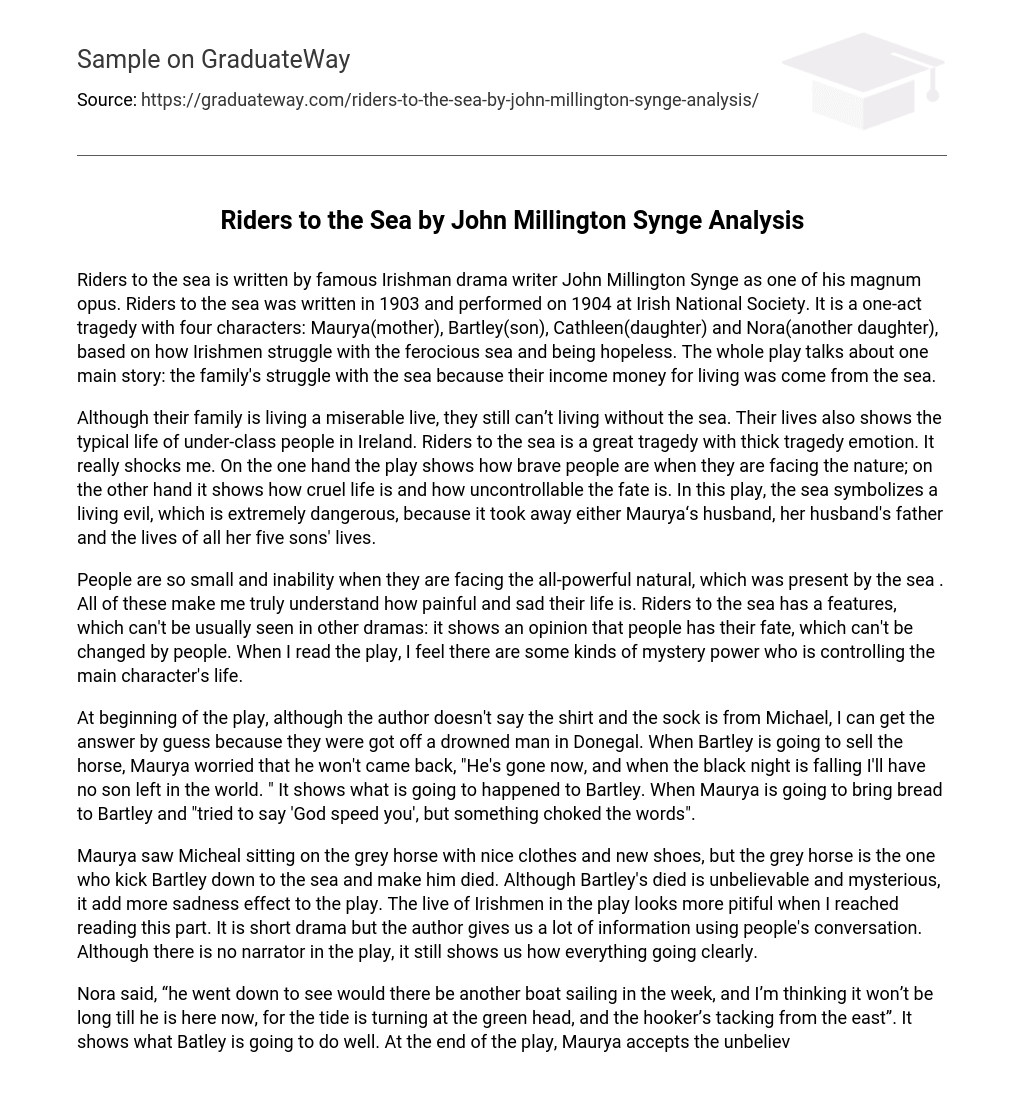The famous Irish playwright John Millington Synge wrote Riders to the Sea, which is regarded as one of his most notable works. This tragic play, performed in 1904 at the Irish National Society, focuses on the struggles of Irish people who confront the unforgiving sea and subsequently experience despair. The main characters include Maurya (the mother), Bartley (the son), Cathleen (the daughter), and Nora (another daughter), together representing the challenges faced by Irish communities dependent on the sea for their survival.
Although living a miserable life, this family cannot do without the sea. Their lives exemplify the typical existence of underclass individuals in Ireland. Riders to the Sea is a profoundly tragic play that evokes strong emotions. It deeply affects me. On one hand, the play depicts the bravery people display when confronted with nature. On the other hand, it illustrates the cruelty of life and the uncontrollable nature of fate. Within this play, the sea symbolizes a malevolent force, representing extreme danger as it claimed the lives of Maurya’s husband, her husband’s father, and all five of her sons.
The vastness of the sea evokes a sense of insignificance and vulnerability in people, while also exposing the sorrows and hardships they endure. “Riders to the Sea” sets itself apart from other plays by emphasizing that individuals are bound by an unchangeable destiny. Throughout my reading of the play, I perceive an enigmatic power dictating the lives of its primary characters.
The play suggests that the shirt and sock belong to Michael at the start, although it is not explicitly stated by the author. This can be inferred from them being discovered on a drowned man in Donegal. Maurya becomes anxious about Bartley selling his horse, fearing he will not return, as she says “He’s gone now, and when the black night is falling I’ll have no son left in the world.” This foreshadows Bartley’s fate. While Maurya goes to bring bread to Bartley, her emotions prevent her from uttering “God speed you.”
Maurya saw Michael on the gray horse, dressed nicely and wearing new shoes. Ironically, this same horse kicked Bartley into the sea and caused his death. Bartley’s sudden death brings great sadness, making the play even more emotional. This section of the play portrays the lives of Irishmen in a way that evokes pity and despair. Despite being short, the play effectively communicates a lot of information through the characters’ conversations. It is interesting to note that there is no narrator, yet the events are presented in a clear and organized manner.
Nora mentioned that he went to check if there would be another boat sailing in the week. She believes that he will return soon because the tide is turning at the green head and the hooker is tacking from the east. This demonstrates Batley’s ability to predict well. Towards the end of the play, Maurya comes to accept the unfathomable truth that her last son has passed away and states, “no man at all can be living forever, and we must be content”. It is impossible for me to comprehend how much pain and sadness she must have felt upon losing her last son. What Maurya has expressed reflects their state of mind.
The text emphasizes the family’s ability to confront and accept the truth. Bartley’s actions demonstrate this characteristic as he is aware of the misfortune that befell his father, grandfather, and five elder brothers. Furthermore, Bartley understands the dangers involved in going out to sea, including the potential loss of his own life. Despite his mother’s desperate efforts to discourage him by highlighting the importance of a son over material possessions, Bartley remains determined to embark on this risky voyage. He insists that he must leave right away and can use a mare for transportation.
Despite being aware of the inevitable fate that awaited him, he was compelled to embark on the journey. As a responsible individual, he felt obligated to support his family, regardless of the risks involved. The calamity stemmed from their sole means of livelihood – venturing into the sea. This destiny was not exclusive to Maurya’s kin but rather common among numerous households in Ireland during that period. Thus, this catastrophe affected not just one home but also countless others.





